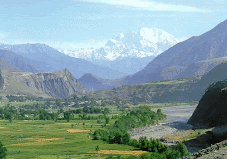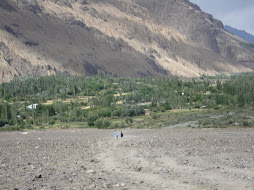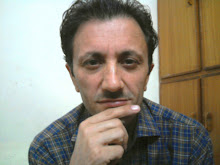By Sadia Qasim Shah
PESHAWAR: The government’s claim that the proposed Sharia-based judicial system was in accordance with the aspirations of the people could be true for Swat and Dir districts but the people of Chitral, a district also included in Malakand division, say they didn’t ask for the Islamic law.
The people of Chitral have expressed concern that introduction of Sharia based judicial system might encourage religious leaders as was the case of Maulana Fazlullah in Swat to meddle with the personal lives of people of Chitral who have been so far living in religious harmony and peace. “Our quiet district, largely bordering Afghanistan and also bordering restless Dir and Swat, is as yet peaceful and our population of Sunnis, Ismailis and Kalash live in perfect harmony,” said Sirajul Mulk, a local elder associated with tourism business.
“We have wrongly been placed in Pakhtoonkhwa. We are not Pukhtun and should have been placed in the Northern Areas. We have been further misplaced in the Malakand Division and are now, whether we like it or not, we are going to get this Sharia-based judicial system,” Mr. Mulk said.
Chitral with more than 400,000 population is different from the rest of the districts in Malakand division in its location, language called Khowar and 13 dialects and its religious groups living in harmony with each other.
“The people of Swat demanded Sharia. We didn’t ask for it. Militancy is not our issue and we are living in peace and we want to relish it”, Mr. Mulk said.
He said many Chitralis like him were concerned that a handful of religious leaders would get a chance to exploit this situation as their voice would be louder than the large silent population on different issues.
North West Frontier Province Chief Minister Amir Haider Hoti had said the Sharia-based judicial system for Malakand division would not be similar to the one introduced by Taliban in Afghanistan but the West had been looking with concern at the NWFP government’s peace accord with the Tehrik-i-Nifaz-i-Shariat Mohammadi. The people of Chitral also feel it would discourage foreign tourists from visiting the scenic valley economically dependent on tourism industry.
Sardar Hussain, a social and political activist based in Booni, highlighting the fact that position of Chitral was quiet different from Swat or any other district in Malakand division elaborated that Chitral was unique as world focused on this area due to its festivals and tourism potential. The so-called pro-Taliban militants demanding Sharia have killed and destroyed Swat. They have earned this region a bad name.
“A foreigner tourist wouldn’t come here as he would not be able to differentiate between Sharia and Nizam-i-Adl Regulation. They would just know that Sharia was the demand of Taliban and government had given in to their demand,” Sardar feared.
“It is not the demand of the people of Chitral but rather the militants. The people of Swat fatigued with war were happy not because of Sharia but the peace. Peace is what we have and we don’t want any changes which pose a threat to it, he said.
Sardar Hussain said people of Chitral, once a princely state, always wanted regular laws which are enforced in the rest of Pakistan.
He claimed that there were rarely any crimes like murder and theft in their area. The literacy rate among girls was higher than boys. People celebrate different festivals and live in harmony with other ethnic and religious groups.
He said it would not be possible to implement a unanimous Sharia as there were several sects with different legal opinions on a single issue.
Another Chitrali representing the Ismaili religious community, which is about 40 per cent of the total population of the district, said people of Chitral didn’t want this kind of judicial system. “We save time and money by consulting our own arbitration and reconciliatory body,” he said.
“Chitral has unique location, culture and people of different ethnicities live here in peace. We don’t feel we have any connection with the rest of Malakand division,” he said while giving reason why they didn’t want any change in the present judicial system.
“We respect the law of Pakistan and don’t demand any Sharia-based judicial system as Sharia is often misinterpreted,” he said while expressing fears that usually different kind of interpretations create complications.
An educated youth from Kalash associated with tourism business said his people were not much aware of Sharia but as a non-Muslim he felt unsure of situation in future.
People of Chitral who feel “forgotten” both by the provincial and central governments feel the proposed judicial system for Chitral is unwanted.
“We no longer crib about being forgotten because in this process we find that we have what our other countrymen are fast losing -- peace and harmony with our traditional values intact. Our present legal system is faulty but surely a debate ought to have taken place to determine our peculiarity and population mix before we were forced into going the way of Swat? What message is this going to give our people? All this coming at a time when the Lowari Tunnel is going to make it easier for rogues to enter our district does not bode well for Chitral”, Sirajul Mulk opined demanding the government to reconsider the proposal as far as Chitral is concerned.--Courtesy Dawn
Monday, February 23, 2009
Subscribe to:
Post Comments (Atom)
Awesome and rugged

Beauty of Chitral

Kishmanja, a beautiful village in Yarkhun valley
Lush green

DIZG: threatened by floods

The legendary village of Ayun in Chitral

On way to Bumburet
Dizg, Yarkhun

Blog Archive
-
▼
2009
(152)
-
▼
February
(52)
- Lowari Tunnel to help tap mineral resources in Chi...
- PML-N Chitral protests disqualification of Sharif ...
- Chitralis & Nizam-e-Adl - Letter
- Chitrali passenger kidnapped in Afghanistan
- Chitralis and Nizam-e-Adl regulation - Letter
- Nizam-e-Adl and Chitralis - Letter
- SHOs reshuffled in Chitral
- Chitral lawyers boycott courts
- Woman attempts suicide in Broze, Chitral
- Outgoing EDO (education)'s services hailed
- Prepardness to meet calamities stressed
- Cash awards announced for grid station workers in ...
- Discrimination in selection for media award
- Chitralis not happy with Taliban's Nizam-e-Adl - L...
- Condolence messages
- Jobless paramedics on hunger strike in Chitral
- Chitralis happy without Nizam-e-Adl
- Haji Lal's death condoled
- Chitral's wetland resources highlighted
- Condolence
- Obituary
- Leaders' rivalry costs Chitral dearly
- MNA says Rs70 million projects for Chitral approved
- Relief supplies for Yarkhun, Laspur valleys demanded
- Revisiting the history of Chitral - 1
- Drosh hospital a picture of complete neglect
- Afghan govt detains Chitral trucks
- Making Chitral Bazaar a Hyde Park in winter
- Four including three of a family killed in Yarkhun...
- Markhor population swells in Chitral
- Skill development for women stressed
- Another suicide case in Chitral
- Locals protest denial of promised jobs in Golen Go...
- Khowar dictionary launched
- Hajis irked by poor arrangements
- Chitrali youth murdered in Taxila
- Health, education sectors top govt’s priority list...
- All-parties moot demands opening of Lowari Tunnel
- Chitral-Ishkashem highway - Letter
- Four killed by stray dogs in Arandu
- Train through Lowari Tunnel opposed
- Woman commits suicide in Chuinj
- New Zakat chairman for upper Chitral
- Gas-fired 320 MW power plant for Pakistan
- Chitral receives fresh rain, snowfall
- Chitral-Shikashim Highway
- Education with a difference
- Convention to take up Lowari tunnel issue
- Another Chitrali killed in Swat
- High LPG, milk prices in Chitral
- World Wetland Day Observed in Chitral
- FDE’s decision to repatriate teachers to home prov...
-
▼
February
(52)
About Me

- Zar Alam Khan Razakhel
- Village Dizg, Yarkhun valley, Chitral, Pakistan
- I blog at http://chitraltoday.net (ChitralToday) about Chitral, its people, culture, traditions and issues. I have been writing about Chitral since 2000. Chitral is a scenic valley in the extreme north-west of Pakistan.
No comments:
Post a Comment